To celebrate the fiftieth anniversary of the longest-running science-fiction show in the world, I’ll be taking weekly looks at some of my own personal favourite stories and arcs, from the old and new series, with a view to encapsulating the sublime, the clever and the fiendishly odd of the BBC’s Doctor Who.
Colony in Space originally aired in 1971.
Are you some kind of scientist?
I’m every kind of scientist.
– Caldwell and the Doctor
Colony in Space is an interesting story for many reasons. For one thing, it’s the first colour adventure to travel to another world. It was the first time since Jon Pertwee took over the title role that the character had been allowed to leave the surroundings of modern-day Earth. Even if he did land in a quarry. Colony in Space demonstrated the possibilities to tell futuristic and extraterrestrial stories in the new and remodelled version of Doctor Who, and the show began to slowly venture further and further afield over the next few years, with the Doctor finally regaining control of his TARDIS in The Three Doctors a little under two years later.
However, Colony in Space is also interesting because it is a script from Malcolm Hulke, who has really become one of the more Doctor Who script writers more inclined to pepper his scripts with political and moral philosophy. Colony in Space is an interesting exploration of those themes, even if it does run a little bit long in places. (That said, Hulke is one of the better writers of the six-part format in the show’s history.)
Spearhead from Space anchored the show on Earth, using the plot device of a Time Lord exile to explain why the Third Doctor would find himself confined to modern day Great Britain. Behind the scenes, the reasons for the change are obvious. The show was transitioning to colour. The series had stretched its budget to present relatively convincing space-age and extraterrestrial backdrops in black and white. Presenting these vistas in colour would be cost-prohibitive.
To be fair, it was a very shrewd decision. I’d argue that the first season of Jon Pertwee’s tenure was one of the best seasons of Doctor Who ever produced, demonstrating that the show could do convincing and daring science-fiction within the constraints of a BBC budget. Those four serials were also experimental in form, and willing to take the show to places it had never really gone before – by virtue of the fact that the Doctor was a time-travelling space explorer.
However, there is a point when a creative decision like restricting the show to present-day Earth is going to hamper the ability to tell good stories, when it is effectively going to hem the series in. In fact, there’s a nice anecdote about Malcolm Hulke, the writer of this adventure, pointing that out to Terrance Dicks:
When Dicks explained these format changes, Hulke summed them up instantly: “So you’ve got two possible plotlines to alternate between from now on. Mad scientists and alien invasions.” Dicks thought about this for a minute, then realised, “$£@! me, you’re right.”
You can sense that the series was aware of these limitations. In fact, the introduction of the Master in Pertwee’s second season seems like an attempt to prove that Doctor Who can still do outlandish science-fantasy, despite the decision to anchor the series on our own little world.
Colony in Space is the next logical point of evolution. The series has introduced a scenery-chewing pantomime villain who can travel in time and space, so the next step would seem to be allowing the Doctor a trip out of his own modern world. In many ways, Colony in Space feels like a proof of concept. It is made quite clear that this is a one-time trip, so that if it doesn’t work the show can return to the established status quo. The Master is present as a familiar villain so things aren’t completely foreign. The serial is extended out to six episodes, something of a cost-saving measure to justify more elaborate sets and production design.
There’s also a sense that Colony in Space is more of a furtive first step than an enthusiastic leap back into the realm of space and time exploration. The Doctor doesn’t end up on an exotic set or a fabulous location. Instead, the alien world is very clearly a rock quarry. It makes sense, as the show is depicting a harsh and untamed planet, but it’s also clearly an attempt to avoid over-extending the production crew. This is hardly the exotic and truly alien wilderness of Planet of Evil, after all.
And yet, despite that, I think Colony in Space is a pretty effective proof of concept. It would seem that the producers agreed. After this rather low-key trip into an off-world future, the following year would open with a time-travel paradox plot in Day of the Daleks. The space adventure that year would be the much more colourful and flamboyant Curse of Peladon, complete with a wealth of aliens, extravagant sets and bright colours. In contrast, Colony in Space looks kind of drab, but it’s still an important step for the series.
I am really fond of Colony in Space, not least because Hulke actually takes advantage of the dramatic shift in storytelling to offer a pretty compelling allegory. It would have been easy to offer a simple space-age base-under-siege adventure in the style of the Troughton era, to make this story a complete throw-back, but Hulke instead uses the story to make some insightful social commentary. Indeed, there’s a sense that Hulke might not have been able to get away with such blatant political commentary had he set the story in the present-day.
There’s something very telling revealed early on in Colony in Space. Hulke sets up what could easily be a base-under-siege story. There’s a colony on a remote planet. Colonists are reporting strange lizard monsters, and are being systematically murdered. A lone survivor of another mysterious outpost show up claiming that the natives – “the primitives” – have massacred his fellow colonists. It’s easy to extrapolate a Troughton-era tale from that outline.
And yet Hulke subverts it pretty quickly. There is no monster. The rambled survivor is a company planet. The villains are human miners looking to exploit the planet’s natural resources by scaring off the colonists with stories about “imaginary monsters” created by “optical trickery.” This is, indeed, perfectly in keeping with Hulke’s approach to writing Doctor Who, and he’s notably one of the few writers who consistently subverts the idea of “monsters” in Doctor Who.
Hulke seems to grasp that the show’s fixation with “monsters” can be problematic. After all, the idea that something is evil because it is alien is a xenophobic idea that seems opposed to the show’s general philosophy. (Which makes its importance to the series a bit… philosophically troubling.) Rather tellingly, it’s a concept that Hulke generally avoids in his scripts. The War Games, Hulke’s farewell to the Second Doctor, rather notably didn’t have “monsters.”
Even Hulke’s stories featuring aliens – usually reptiles – were generally more nuanced than simple “monster” tales. The Silurians had reptile people, but made the point that reptile people were people too. The Frontier in Space was as sympathetic to the Draconians as it was to the humans. Invasion of the Dinosaurs treated the eponymous reptiles as a distraction from the real problem, effectively innocent patsies exploited by the true villains of the piece.
This was a very conscious decision by Hulke, who conceded that his scripts were political:
But remember what politics refers to: it refers to ‘the relationships between groups of people.’ It doesn’t necessarily mean Left or Right, Labour or Conservative, it’s the relationships of groups of people so really all Doctor Who stories are political. Even thought the other people look like reptiles, they’re still people. I’d say it’s a very political show. In my stories, the ‘baddies’ aren’t really bad because they’re doing what they think is right. I find it hard to imagine anyone as totally bad or totally inimical, and there’s a great amount of… well, although I say it myself, philosophy and politics in my science fiction, and Doctor Who in particular is a great opportunity to get across a point of view. And the point of view that I have is that, let’s say a maggot, that’s just about to eat someone alive, is not necessarily a bad maggot – that’s the way he is, just maggoty!
So it’s nice that the show’s first space story avoids having an obvious monster. Instead, Hulke presents a more complex moral and ethical conflict, where the real villain is unchecked capitalism, in the form of the IMC – the Interplanetary Mining Corporation – keen to exploit natural resources.
“This planet has been classified as suitable for colonisation,” the colonists protest when they find the Doctor. “Once your big mining combines move in, you’ll reduce it to a galactic slagheap.” When the miner Caldwell has doubts about the ethics of what the corporation is doing, the villainous Dent is quick to appeal to his better nature wallet. “Look at it! It’s going to make you rich. This planet has enough duralinium to double the company’s profits next year. Your bonus will be big enough to retire on.”
Hulke hammers the notion of the evils of corporate greed pretty well. Occasionally, he’s a little ham-fisted, both in characterisation and in commentary. Dent might as well have a big evil moustache to twirl. Hulke also seems to avoid any real nuance or sophistication. At one point, Dent boasts, “What’s good for IMC is good for Earth!” It’s a line that is clearly based off an infamous misquote from Charles E. Wilson. That misquote is often used as a criticism of unchecked capitalism, and it feels like Hulke is labouring his point just a bit too hard.
Hulke also presents a vision of the future that was clearly constructed with a social conscience. Conditions on the colony are harsh, but we get the sense that it’s worse back on Earth. “At least it’s better than being back on Earth,” Mrs. Martin notes. “No room to move, polluted air, not a blade of grass left on the planet and a government that locks you up if you think for yourself.” While the IMC concedes that the planet is over-populated (that’s why they need to mine), this also suggests that the planet has become politically decayed and corrupt.
The colonists, then, are presented as the spiritual successors of the counter-culture movement. They didn’t expand outwards for the thrill of exploration or to venture into the unknown. It seems that they left Earth simply because they couldn’t stand life within the system. There’s a very clear contempt for the colonists from most of the miners, who seek to belittle and dismiss these people in much the same way that the establishment tended to write off the opinions of various counter-cultural movements. “All colonists are eccentric, Morgan,” Dent explains at one point, “otherwise they wouldn’t be colonists.”
There’s a very under-developed thematic point concerning the doomsday weapon below the surface of the planet. The plot point itself is set up rather well over the course of the serial, with Hulke doing a requisite amount of foreshadowing and hinting. However, the notion of an alien society destroyed by their own doomsday weapon feels like a bit of an awkward addition to an already message-heavy script.
We’re informed that the primitives are the result of social decay caused by their own advanced weaponry. “Once the weapon was built, our race began to decay,” we’re told. “The radiation from the weapon’s power source poisoned the soil of our planet.” It’s a literal erosion and corruption, but it is implicitly a moral collapse as well. However, this is a decidedly anti-military point, and while it doesn’t jar with the story’s strong condemnation of capitalism, it does feel distinct enough that raising it in the last episode feels like a cop-out.
Hulke’s script is interesting because Pertwee’s Doctor tends to be more establishment than any of the other iterations of the character. He even holds down a government job, which he retains even after his exile has officially ended. Pertwee was more likely to mingle with people in authority and power than people oppressed or exploited. Hulke points repeatedly to the difficulties this poses for the character. The Silurians could be interpreted as a direct criticism of the character’s relationship with U.N.I.T., while Invasion of the Dinosaurs accuses him of selling out.
While Colony in Space has the Doctor siding with the renegades against the establishment, Hulke concedes that this is something of an awkward position for the Third Doctor. Indeed, the Master explicitly has the advantage in Colony in Space because he is clearly aligned with those in power. Though the Doctor may to dismiss his official documents as “bureaucratic mumbo-jumbo”, the fact that the Master has proper documentation gives him a clear advantage.
“What? No interplanetary travel permit? No registration for your Tardis? No personal identification?” the Master demands. When the Doctor tries to dismiss their importance, he observes, “Maybe, but in this regimented age of ours, essential. Without these, my dear Doctor, you do not exist.” To be clear, the Doctor is at no more a disadvantage than he has ever been landing on an alien world. The First or Second Doctors would never be impaired by the fact they don’t have the proper paper work. However, Hulke makes it clear that the Third Doctor is at quite a disadvantage when he’s aligned against the establishment.
In a scene that could have easily inspired the superb Midnight, the Master is able to effectively undermine and incapacitate the Third Doctor by pointing out that he has no formal identification or official authority. “I understand this man is not one of your colonists?” the Master inquires. “Does anybody know who he is? Where he came from? Has he in fact given a proper account of himself?” Again, this has never stopped the Doctor before, but it seems to put the Third Doctor off-balance, suggesting that this iteration is decidedly uncomfortable when circumstances for him to stand against those in authority.
It’s worth talking for a moment about the Master as a character, as he existed in the Jon Pertwee era. He is, we’re told, a renegade Time Lord. However, producer Barry Letts originally had a very different idea for the character. In a script designed to write Roger Delgado out of the role, The Final Game, Letts and Robert Sloman would have revealed that the Master was apparently an aspect of the Doctor. Fitting with their incorporation of New Age spirituality within the show, the Master would have been the id to the Doctor’s ego.
To be fair, this makes a surprising amount of sense. After all, the Time Lords seem to insist that the Doctor deal with the Master. In The War Games, the Time Lords were very quick to directly intervene when the Doctor caused problems. However, they continually refuse to deal with the Master, despite the fact that they know exactly where he is. In fact, in both Terror of the Autons and Colony in Space, they make a concerted effort to force the Doctor to confront the Master.
You could argue that this is just Time Lord laziness, and a sense that it’s easier to get somebody else to clean up their mess. After all, it’s not as if they could have asked the Master or the Rani to help the Doctor in The War Games, but the Doctor’s basic morality makes him an easy mark. I am not so convinced, though. The ease with which they intervened in in The War Games suggests that the master shouldn’t really be that big a problem if the Time Lords made an effort to stop him.
The notion that the Master is just a facet of the Doctor’s personality would make a great deal of sense of a number of factors. For one thing, if you don’t believe that the Master is really the Meddling Monk or the War Chief, it would explain why he only emerged to challenge the Third Doctor. The Third Doctor’s exile makes him unique, and his unique regeneration would provide a point where the Master could have fractured from his personality – sort of like the Valeyard would in The Trial of a Time Lord.
That doesn’t explain how the master has a history with him in Terror of the Autons, but it seems strange that a character so closely linked with the Doctor that he could pass as his “secret brother” would only start showing up now. It also explains, perhaps, why the Master tends to spend so much time near Earth, despite the fact that the Doctor is grounded there. You’d imagine that you’d want to stay away from the planet where the guy who constantly humiliates you is based.
Then again, Colony in Space breaks the pattern, with the Doctor going to the Master rather than vice versa. So let’s concede that this isn’t a perfectly logical explanation. That said, I do like it and I think it accounts for some of the biggest contrivances of the Master’s character. It also has several sizeable holes, but so does pretty much every theory. Watching Colony in Space, it seems like Hulke is generally writing around this idea of the Master as the representation of the Third Doctor’s id.
I’ve remarked that Hulke is the most sceptical writer for the Third Doctor, one of the few writers on staff who seems genuinely uncomfortable with the fact that the Third Doctor is so decidedly establishment. To Hulke, the Master’s thirst for power is just an amplified and sinister exploration of the Third Doctor’s establishment tendencies. The Master claims to be “the adjudicator”, acting with lawful authority from a central government to resolve a problem – while laughing at the idea that such an establishment man could be impartial.
Indeed, in the final episode, the Master appeals to the Doctor to grasp absolute power with him. It’s an argument that we see restated often over the course of the show’s history, but it never feels quite as convincing as when the Master pleads with the Third Doctor to become a benign dictator. “We could be masters of the galaxy! Think of it, Doctor, absolute power! Power for good. Why, you could reign benevolently, you could end wars, suffering, disease. We could save the universe.”

Okay, someday the Master will figure out that the Doctor’s unlikely to agree to rule the cosmos together. But you’ve got to have a dream.
The Doctor is willing to align himself with U.N.I.T., a multi-national armed forced, in order to regain his freedom. He works so closely with those in power that it seems almost possible that the prospect of such authority would be tempting – to use it, as the Master teases, to do the greatest good. Indeed, it’s tempting to believe that the Master is a challenge set by the Time Lords that they need the Doctor to defeat before they can end his exile.
Hulke seems to suggest that the needs to purge that sort of establishment outlook before he can earn the power of a Time Lord again. “The point is that one must rule or serve,” the Master explains, outlining the conflict between the two in strictly class terms. “That’s a basic law of life.” The Master doesn’t grasp that it’s possible for one to exist entirely outside the system, as the Doctor used to. In fairness, it seems like the Third Doctor is struggling with that concept himself, working as a part of the system for pretty much the entirety of his tenure. (His few “wandering adventures” often feel like holidays from his official position.)
Hulke’s script is occasionally a bit heavy-handed. The anti-capitalist message feels a little too obvious at points, and Colony in Space has a very weird way of looking at “the primitives”, the native population of the planet in question. While the script explains that they are the relics of a once-advanced civilisation, it really has no interest in them beyond the fact that they are… well, primitive. They are silent, obedient and offer the colonists service in exchange for food.
They are also portrayed as technically competent (able to hand their masters the right tools at the right point through telepathy) but easily fooled (the Doctor distracts one with a magic routine) The implications are a bit problematic, to be frank. It seems like the indigenous people have no defining attributes beyond being primitive. Hulke might be willing to engage with some social commentary and to make some criticisms of capitalism, but the story doesn’t handle colonialism quite as well. It seems that Pertwee’s Doctor can only side against the establishment so much – it would be The Mutants before the Pertwee era dared to handle colonialism.
I do like the way that Hulke handles the Master’s involvement. He seems to concede that the Master can’t be a surprise reveal for the fourth time in a row. So the opening scene confirms that the Master is going to show up. The opening line is, “Are you sure the Master knows?” And the reveal is surprisingly undramatic. There’s not attempt to mask Delgado’s voice when he addresses the colony. Similarly, the revelation that he is “the adjudicator” is positioned smack-bang in the middle of an episode, avoiding the temptation for an end-of-episode twist.
I like Colony in Space. It is a bit awkward in places, but it’s a very socially conscious piece of writing, and one that shrewdly refuses to turn into a nostalgic celebration of an era that has passed. Malcolm Hulke continues to be one the best writers working on the show in this era, and it’s a thoughtful and clever script. If Doctor Who‘s return to adventuring in time and space was inevitable, Colony in Space seems like a triumphant way of doing so.
You might be interested in our reviews of the eighth season of the classic television show:
- Terror of the Autons
- Mind of Evil
- Claws of Axos
- Colony in Space
- The Dæmons
Filed under: Television | Tagged: arts, Auton, bbc, Charles E. Wilson, Colony in Space, Dicks, doctor, DoctorWho, Earth, fiction, Jon Pertwee, literature, Malcolm Hulke, Master, Online Writing, Planet of Evil, science fiction, tardis, terrance dicks, Time Lord, War Games |















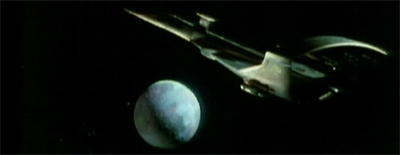








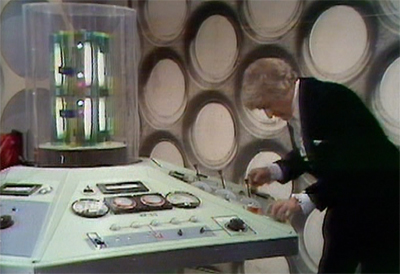
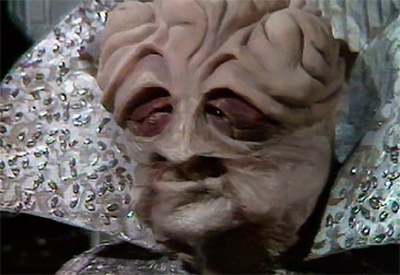

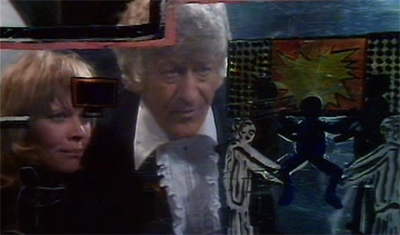


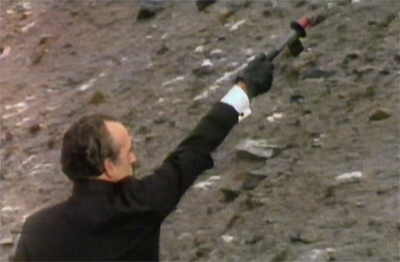







Leave a comment